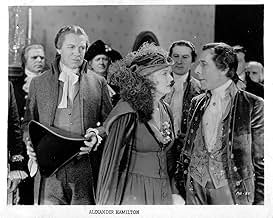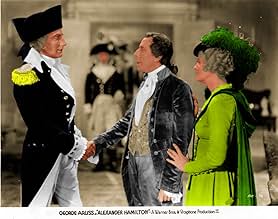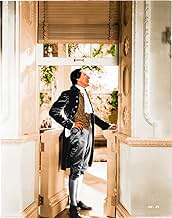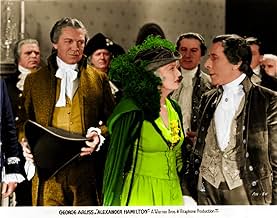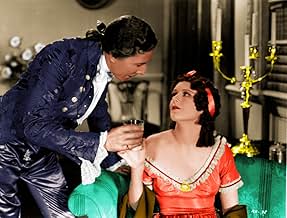Ajouter une intrigue dans votre langueWith the end of the Revolutionary War in 1783, General George Washington took Colonel Hamilton with him into the newly formed government. While the main disagreements in the early days was o... Tout lireWith the end of the Revolutionary War in 1783, General George Washington took Colonel Hamilton with him into the newly formed government. While the main disagreements in the early days was over paying the soldiers who had fought in the War, Hamilton also dedicated his energies to... Tout lireWith the end of the Revolutionary War in 1783, General George Washington took Colonel Hamilton with him into the newly formed government. While the main disagreements in the early days was over paying the soldiers who had fought in the War, Hamilton also dedicated his energies towards a national bank so that the United States would be able to trade with other countrie... Tout lire
- Second Ex-Soldier
- (uncredited)
- Zack Whalen
- (uncredited)
- Molly Bingham
- (uncredited)
- Undetermined Role
- (uncredited)
- Martha Washington
- (uncredited)
- Rabble Rousing Townsman
- (uncredited)
- Harvey Taylor - Ex-Soldier
- (uncredited)
Histoire
Le saviez-vous
- AnecdotesThe play, "Hamilton," opened on Broadway in New York City, New York, USA on 17 September 1917, closing in November 1917 after 80 performances. The opening night cast included George Arliss, who originated his movie role as Alexander Hamilton, Florence Arliss (Arliss' real life wife) as Betsy Hamilton, and Jeanne Eagels as Mrs. Reynolds.
- GaffesNo amount of makeup could disguise the fact that George Arliss (who was over 60 years old at the time this film was made) was far too old to portray the then 30 to 40 year old Alexander Hamilton shown in the time frame of the film.
- Citations
General Philip Schuyler: [after watching him persuade two rivals to vote for his bill] Alexander, you're a wizard.
Alexander Hamilton: No, General. But I'm learning to be a politician.
- ConnexionsFeatured in Daffy Duck in Hollywood (1938)
- Bandes originalesYankee Doodle
(ca. 1755) (uncredited)
Traditional music of English origin
Played by marching soldiers during the opening credits and at the end
Of a more minor error, like the musical "Hamilton" (2020), which I watched the night before, it conflates the roles of James Madison and James Monroe, with this one favoring Monroe and the other Madison, into one character for both the Compromise of 1790 and the Reynolds scandal. Worse, this film largely portrays Monroe and Thomas Jefferson as nefarious political neophytes who, ultimately, remain honorable by promising secrecy to Hamilton's affair with Reynolds. Never mind that, really, they were the ones who spread rumors of the scandal to undermine Hamilton's political chances--all of which had nothing actually to do with the past assumption bill and more to do with the emerging party dynamics post the Washington administration. Moreover, the play invents a fictional character, a Senator Timothy Roberts, to be baddie in exposing the tabloid fodder.
Meanwhile, the married Maria Reynolds is depicted as a vamp complicit from the start in tricking and blackmailing Hamilton, which I suppose could be historically true to some extent, but it's also a dubious and convenient narrative trope. The picture doesn't dare explicitly admit Hamilton even had sex with her, while it also under-reports the sums of money extorted from the treasury secretary. I appreciate the ambiguity and economy, as to whether they copulate, of the fade to black when Hamilton walks up Reynolds's steps to retrieve his cloak, which may've seemed necessary even for a pre-code production. But, in fact, Hamilton admitted the affair, and it wasn't a one-night stand; it lasted months.
Historical inaccuracy is the least of the picture's problems, though. There's also a stereotypical black servant with all the aggravating "yessuhs" and the rest written by white men for how they think black people acted or spoke. A creaky early talkie, it's also a dully filmed play--albeit synchronized-sound technology and practices had improved somewhat in the intervening couple years between "Disraeli" and "Alexander Hamilton." There's even a non-diegetic score during one sequence, which is maudlin, but nonetheless unusual for early talkies. Of course, there's also a scene involving diegetic music, which involves Mrs. Hamilton singing and playing the piano--a common tactic of early sound films to incorporate bits of recorded music.
Anyways, having now seen three Arliss vehicles, I'm suspecting that he had a hand in selecting his co-stars based on them being so lousy as to not upstage him. Besides the performances for the aforementioned side characters, Doris Kenyon is particularly atrocious as a withering-flower sort of depiction of a wife. It's nauseating. Too bad, too, because I still have fond memories of her from the days before Hollywood, in Fort Lee, New Jersey, when she played ingénue in the meta-film "A Girl's Folly" (1917). Consequently, Arliss has an admittedly commanding screen presence, I suppose, but caricaturizations of these historical fuddy-duddys tends to be a bore and far less interesting than the historical figures appear to have been in better-composed historical records.
- Cineanalyst
- 3 juill. 2020
- Lien permanent
Meilleurs choix
Détails
Box-office
- Brut – États-Unis et Canada
- 987 540 $ US
- Brut – à l'échelle mondiale
- 1 277 480 $ US
- Durée1 heure 10 minutes
- Couleur
- Mixage
Contribuer à cette page


